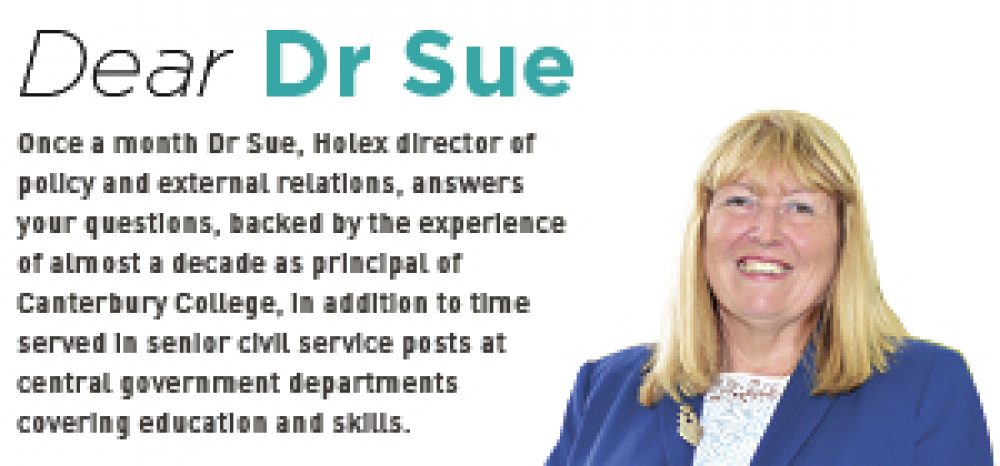Dr Sue, director of policy and external relations at Holex, answers your questions, backed by her experience as principal of Canterbury College and in senior civil service posts in education and skills.
Question One: Are we an effective board?
We are about to evaluate our effectiveness as a board. I am aware of the proformas available, but are there key questions we can ask, to help cut through what can otherwise feel like a bureaucratic exercise?
Answer: I know what you mean about board performance exercises; they can get very mechanistic. The Code of Good Governance for Colleges was about governance values as much as rules, but sometimes that is lost. Demonstrating good governance is coterminous with college performance, so here are my key questions for determining whether a governing body is effective:
- Was the agreed vision and plan implemented, and did the college meet your key targets of student recruitment, retention and achievement? How do you know?
- Did you meet your financial forecast?
- Were there surprises? Were divergences from the plan brought to your attention and mitigation agreed?
- Do board meetings have a balance of support and challenge? When challenged do you get constructive, informative answers or is the behaviour defensive?
- Can governors give five examples of where the board had impact?
- Do board members leave a meeting feeling they have contributed to the discussion; are their views sought by the chair and does the executive react in a positive manner?
- Does the board seek the views of students and staff and does the board act on them?
- Do you correlate what you hear in meetings first-hand with visits and meetings with staff, stakeholders and students?
- What does Ofsted say about the board?
- What does the community you work in say about the governors and the college?
Question Two: Monitoring our HE provision
We a have a lot of HE students, some funded direct from loans and others in partnership with two universities. The universities monitor student experience and course performance but should we take an active interest?
Answer: Yes, is the simple answer. For those that are directly funded, you should have challenge and scrutiny processes and a robust system for reviewing the student experience. Your college may have taken part in the new HEFCE run Teaching Excellence Framework pilot, and if so would have just been told whether it was awarded with a bronze, silver or gold. The Quality Assurance Agency for Higher Education sets out the quality code, and the Office of the Independent Adjudicator how they deal with student complaints.
Induction weaknesses often result in early drop-out
For students enrolled as part of a partnership agreement, you should revisit your agreement with the universities and review your responsibilities. Some universities expect you to conform to their quality policies and processes; others may be satisfied for you to continue with your own. However, either way, the university is ultimately responsible for the quality of the partnership students.
You should also be briefed on the role of Office for Students. This new public body will be the market regulator in place of the HEFC and the Office for Fair Access.
The areas you should consider are enrolment and retention: induction weaknesses often result in early drop-out. You should regularly review the HE student experience survey and see what it tells you about each course. Is there correlation between drop-out and how they rate their experience?
When thinking of the type of questions you should be asking, you should look at the Committee of University Chairs’ material plus the guidance on the HE Leadership Foundation website.








Your thoughts